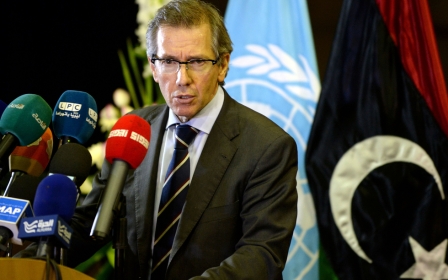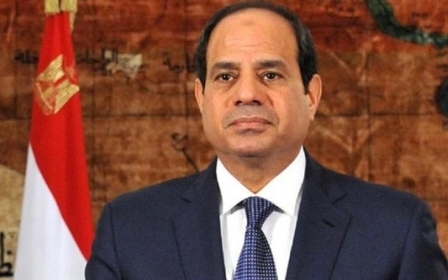UN Libya envoy secretly worked with UAE to back a side in civil war

Bernardino Leon was covertly working with the United Arab Emirates to support one side in Libya’s civil war while serving as the UN envoy attempting to mediate an end to the country’s conflict, an email seen by Middle East Eye appears to suggest.
On 31 December last year Leon, an experienced Spanish diplomat, sent an email to UAE Foreign Minister Abdullah bin Zayed al-Nahyan, via an Emirati intermediary for security reasons, in which he made clear he was working at the behest of Abu Dhabi in his role as a UN mediator.
“All my movements and proposals have been consulted with (and in many cases designed by) the HOR and Aref Nayed and Mahmud Jibril (with whom I speak on a daily basis) following Your request,” Leon wrote, capitalising “your” to reflect Abdullah’s royal status in Abu Dhabi.
Mahmud Jibril is a prominent Libyan politician who lives in the UAE and who previously served as Libya’s interim prime minister during the 2011 NATO-backed revolution that overthrew the late Muammar Gaddafi. Aref Nayed is the House of Representatives (HoR) ambassador to the UAE.
Throughout Leon's email, he refers on several occasions to previous conversations with Abdullah bin Zayed and frames his plan in terms of how it can benefit the UAE. At one point, he said that the “UN is not today a problem for the interests of the country we discussed (meaning the UAE), but obviously I don’t know what can happen in the future.”
The Guardian reported the leaked email on Wednesday, as well as news that Leon will in December begin a new £35,000 per month job directing the Emirates Diplomatic Academy. The academy trains UAE diplomats and its board of trustees is chaired by Abdullah bin Zayed.
Leon gave a press conference at the UN in New York on Thursday, where he said that he had “followed the procedures” in relation to his new job in the UAE.
He admitted that he “could have done things differently” but defended his attempts to broker a peace deal in Libya.
“Hundreds of Libyans have been working for a year on this agreement,” he told reporters. “Is it fair now to say that the result of all this work is biased?”
Plan to make the GNC disappear
Libya is in the midst of a civil war to determine control of Africa’s largest oil reserves.
On one side, there is the Tripoli-based General National Congress (GNC), which is backed militarily by the Misratan-led Alliance of Libya Dawn, and is also said to receive support from Qatar and Turkey.
On the other, the HoR was elected in June last year to replace the GNC, but it was forced to move east from Tripoli after Libya Dawn seized control of the capital in September. The HoR is allied with the Libyan National Army, which is headed by veteran general Khalifa Haftar - both have been heavily backed by the UAE, including militarily when Abu Dhabi began bombing Libya Dawn positions in Tripoli last year.
Officially, Leon has been attempting to broker a peace agreement between the HoR and GNC to form a unity government and end an ongoing civil war that has killed over 4,000 people in 18 months.
However, in his email to Abdullah bin Zayed, Leon explicitly says a peace conference where the two warring sides are treated equally is in his mind the worst possible solution for Libya.
“This is…a worse option… as you [Abdullah bin Zayed] have very rightly pointed out, because it will treat both sides as equal actors,” Leon wrote, adding that this will bypass the “legitimate” HoR.
Leon’s plan as set out in the email was to reconcile Hafter with the Misratan militias and make the Muslim Brotherhood-dominated GNC “disappear”.
The HoR is recognised by the international community as Libya’s legitimate parliament, however, this is hotly contested on the domestic front. The Supreme Court, which is based in Libya Dawn-controlled Tripoli, handed down a ruling in November last year that it said invalidated the HoR.
The reconstituted GNC is dominated by members of the Justice and Construction Party, the Libyan branch of the Muslim Brotherhood.
The UAE designated the Brotherhood a terrorist organisation last November and has aggressively pursued the group at home and abroad since 2011, under the leadership of Abu Dhabi Crown Prince Mohammed bin Zayed al-Nahyan.
In order to avoid a peace conference where participants would be treated equally, Leon told the UAE’s foreign minister he had a “strategy, which I am pretty sure should work, to completely delegitimise [the] GNC.”
Leon’s plan was to unite the HoR, which at the time was ridden by infighting, and gain international backing for Haftar, while at the same time getting the GNC to “disappear” by assessing whether “moderate” Misratan politicians would be prepared to split from the Tripoli-based parliament.
“I can help and control the process while I am there,” Leon wrote.
UN mediation role called into question
Nearly a year after this email was sent, the UN-led peace process is a state of disarray. In late September, Leon announced that a Libya peace plan had been finalised and a draft agreement put to the parties for consideration.
Effectively sidelining the GNC to an advisory role rather than decision makers, Tripoli rejected the agreement. There were mixed reports about whether Tobruk, which came under increasing pressure as its initial mandate expired on 20 October, had approved the draft or not.
The proposal drew protesters from both sides to Libya's streets, including a peaceful demonstration in Benghazi in which six people were killed and nine injured when missiles were fired into thousands of people.
Participants and observers close to the negotiation process told MEE on Thursday that they were not surprised by the revelations about Leon’s relationship with the UAE.
“This matter is not new. There is a question mark as to why it has come out now at the very last minute when [Leon] is leaving and handing over to someone else,” said Mohammed Abdul Malik, the European spokesperson for the Muslim Brotherhood Justice and Construction Party.
“I am more than confident that it is not just this,” Mohamed Eljarh, a Libyan academic researcher and activist who is in Tobruk, said of the emails. “It is much more. There are a lot of others things that are happening from a lot of other players that are complicating the Libyan problem when the Libyan problem should not be as complicated.”
Eljarh said there has been widespread speculation that other countries have sought to influence individuals involved and around the negotiations as well as multinational corporations.
When contacted by Middle East Eye, a UN spokesperson refused to answer whether Secretary-General Ban Ki Moon knew of Leon's communications with the UAE.
“All I can say is that the Secretary-General expects envoys to be focused on their current role," a spokesperson said. "The Secretary-General is appreciative of Mr Leon’s work and the progress [in Libya’s peace process] speaks for itself.”
The email raises not only questions about what the UN knew and when, and the agency’s – and even the international community’s - role in mediating Libyan peace moving forward.
“Beyond what one thinks about the personal choice of Mr Leon, I think it is very problematic for the UN that such immediate follow-up employment with a party directly involved is even possible, institutionally speaking,” said Kristina Kausch, head of research on Europe and the Middle East for the Madrid-based think tank FRIDE, referring to Leon's new job as director of the Emirates Diplomatic Academy.
Libyans, said Eljarh, will question whether they can trust Leon’s replacement, Martin Kobler, announced late last month.
“It will also raise the question of someone’s turn to win Kobler. Maybe somebody has already been in touch with him . . . maybe somebody is already trying to get Kobbler,” he said.
Abdul Malik said he understands that Kobler has at least one senior aide from Jordan which causes him concern.
“Jordan is another country that is biased,” he said. “We would like to see someone from a country that is known to be neutral that might have experienced some of the chaos we have seen. Maybe someone from Ireland or Finland which has no economic links from Libya.”
One of Leon’s mistakes, he said, was that he kept the two sides separated and limited face-to-face dialogue, but the two parties have been meeting separately. “It’s going well, and I think along with what Leon has been able to achieve,” Abdul Malik said, “we could come out with a workable proposal or agreement.”
“We may not like everything in it, but I think it’s a workable thing that we can work on ... to build on, and improve it which is very important,” he said. “To start all over again, that would be terrible.”
Read the full text of Bernardino Leon's email to Abdullah bin Zayed al-Nahyan
Stay informed with MEE's newsletters
Sign up to get the latest alerts, insights and analysis, starting with Turkey Unpacked
Middle East Eye delivers independent and unrivalled coverage and analysis of the Middle East, North Africa and beyond. To learn more about republishing this content and the associated fees, please fill out this form. More about MEE can be found here.




